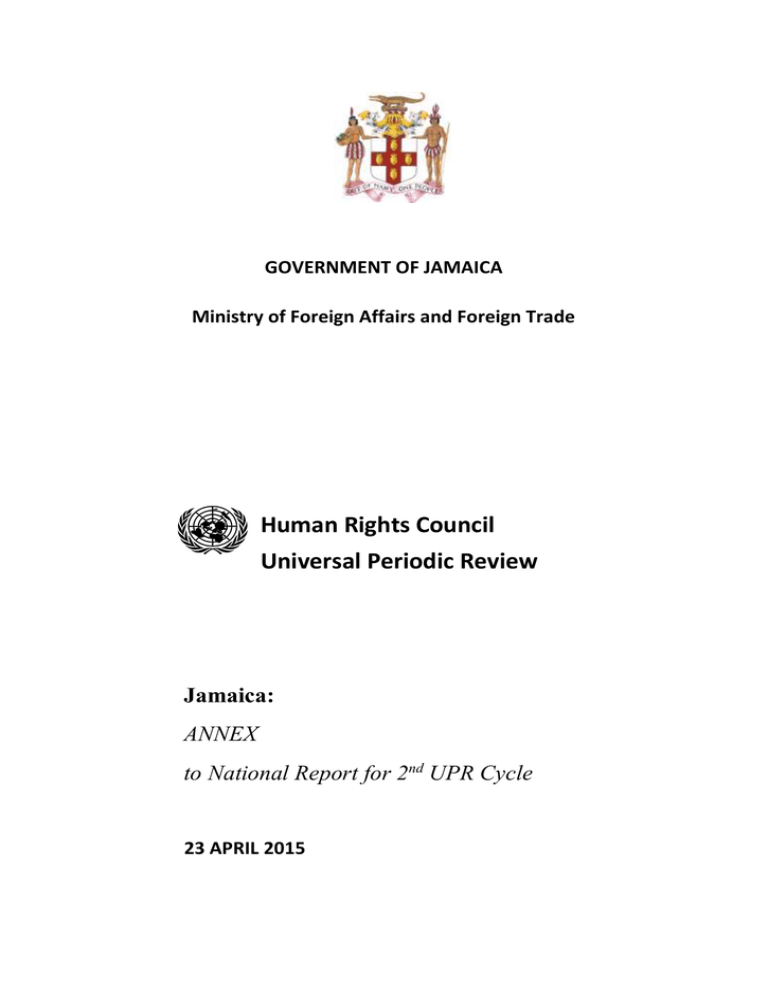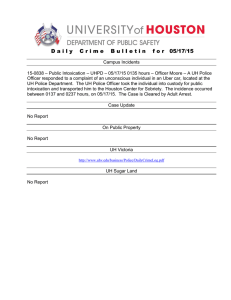Human Rights Council Universal Periodic Review Jamaica:
advertisement

GOVERNMENT OF JAMAICA Ministry of Foreign Affairs and Foreign Trade Human Rights Council Universal Periodic Review Jamaica: ANNEX to National Report for 2nd UPR Cycle 23 APRIL 2015 DETAILED INFORMATION TO BE READ IN CONJUNCTION WITH JAMAICA’S NATIONAL REPORT: UN Special Procedures (Recommendations 99.5, 99.6, 99.7) Jamaica has made significant progress in addressing many of the recommendations made by the Special Rapporteur on Torture and other cruel, inhuman or degrading treatment or punishment viz paragraph 77 of his Report (A/HRC/16/52/Add. 3). Below are Jamaica’s responses to those recommendations that are not covered in other sections of this report: a) Issue, by the highest authorities, a public condemnation of torture and ill-treatment, including excessive use of police force. The Charter of Fundamental Rights and Freedoms (Constitutional Amendment) Act, 2011 provides, inter alia, for constitutional recognition, promotion and protection of the right of every person to equitable and humane treatment by any public authority in the exercise of any function; protection from torture, or inhuman or degrading punishment; and due process. The Ministers of Justice and National Security have condemned, on various occasions, incidences of ill-treatment perpetrated by agents of the State. Both Ministers issued press releases following the death of Mr. Mario Deane in August 2014 while in police custody. b) Ratify the Convention against Torture and Other Cruel, Inhuman or Degrading Treatment or Punishment and the Optional Protocol thereto, providing for regular preventive visits to all places of detention by an independent domestic monitoring body; a declaration should be made with respect to article 22 of the Convention, recognizing the competence of the Committee against Torture to receive and consider communications from individuals who claim to be victims of a violation of the provisions of the Convention. The proposal to ratify the Convention and its Optional Protocol is under consideration. In relation to “…providing for regular preventive visits to all places of detention by an independent domestic monitoring body”, a multi-stakeholder Committee was convened in August 2014 on the instructions of Cabinet, to review and submit its findings and recommendations regarding the detention system (police lock ups and correctional facilities). The Committee, jointly chaired by the Ministers of National Security and Justice, includes representatives of human rights and non-governmental organisations. The findings and recommendations of the Committee are to be considered by Cabinet. Issues regarding police custody and detention (in particular, for vulnerable persons such as children) and access to bail, are among the matters being considered by the Committee. Also under consideration are proposals concerning a more structured approach to lock-up visits by Justices of the Peace and actions to be taken consequent upon such visits. d) Pay adequate compensation to all successful complainants who lodged an individual communication under the First Optional Protocol to the International Covenant on Civil and Political Rights, in accordance with the final views of the Human Rights Committee, including Michael Freemantle. On review of the case and based on the outcome of investigations carried out by the Department of Correctional Services, it was determined that Mr. Freemantle would not be compensated. Checks on matters related to “…compensation to all successful complainants…” are ongoing. g) Reduce, as a matter of urgent priority, the period of police custody to a time limit in line with international standards (maximum 48 hours); after this period, detainees should be either released or transferred to a remand facility under a different authority. The Government’s multi-stakeholder Committee is considering issues relating to police custody and detention. The Bail Act is being reviewed by the Committee in the light of issues concerning, inter alia, period of detention in police custody. Notably, section 22 of the Act provides in general that where a person who is arrested or detained is not charged within 24 hours after such arrest or detention, such person is to be brought forthwith before a Resident Magistrate or a Justice of the Peace for an order to release that person or such order as the Resident Magistrate or a Justice of the 1|Page Peace deems fit having regard to the circumstances. Legislation provides for extended detention where an identification parade is required in relation to that person. This issue of extended detention and options for imposing time restrictions on such orders for extension are among the matters currently under review. h) Establish accessible and effective complaints mechanisms in all places of detention; complaints by detainees should be followed up by independent and thorough investigations, and complainants must be protected from reprisals. The Office of the Public Defender has the remit to receive complaints from inmates, and has received complaints from persons in detention. i) Ensure that justices of the peace and resident magistrates conduct regular visits to all police lock-ups. Justices of the Peace currently conduct visits to police lock-ups. The aforementioned multistakeholder Committee is considering proposals to introduce a more structured approach to such visits and actions to be taken consequent upon such visits. m) Place persons with mental disabilities, and particularly those suffering from severe mental illnesses, in a specialised psychiatric institution. A Committee has been formed to address the situation relating to mentally ill inmates who are held in prison “at the Court’s pleasure” (e.g. when an inmate is unfit to plead); and to ensure that the cases of mentally ill inmates are taken before the Court at regular intervals for assessment to determine whether such inmates are fit to be tried. n) Immediately close down the police lockups at May Pen and Montego Bay police stations. Both lockups remain open. Specific improvements have been made to address a number of concerns raised in relation to the May Pen police station. Extensive repairs were carried out including the replacement of partition walls, doors, installation of security fixtures and fittings, as well as metal stairs. Several accessories were also installed including electrical lamps and receptacles as well as water taps in cell bath areas. p) Transfer the responsibility of places of detention for juveniles to the Child Development Agency. The Department of Correctional Services (DCS) will maintain responsibility for places of detention for juveniles. Changes are being made to the mandate of the CDA that will result in closer collaboration with the DCS. Specifically, the CDA will become the focal point for comprehensive child care and protection standards to include children in the care or custody of the State. Women’s Rights & Gender Equality (Recommendations 98.8, 98.9, 98.10, 98.11, 98.13, 98.14, 98.15, 98.16, 99.1, 99.11, 99.12, 99.28, 99.29, 99.30, 99.26, 99.27, 100.15) Various government agencies including the Bureau of Women’s Affairs (BWA), as well as NGOs, engage in social outreach programmes including the Schools Education Programme (SEP) in an effort to address gender-based violence (GBV). Hospitals, health centres, police stations and the court system receive reports of cases of different types of GBV and record incidents. Public sector departments with responsibility for domestic violence, child abuse, sexual offences, etc. have also been making attempts to collect and analyse data. The programmes include the following: THE CENTRE FOR THE INVESTIGATION OF SEXUAL OFFENCES AND CHILD ABUSE (CISOCA), JAMAICA CONSTABULARY FORCE has offices in all Parishes, and offers a complete programme for victims, including evaluation of each complaint; interviewing and recording statements; medical 2|Page examination, treatment, medication and medical certificates for evidential purposes. CISOCA also prepares exhibits for forensic analysis; apprehends perpetrators and makes arrangements for arraignment. It also provides assistance with the rehabilitation of victims through the procurement of counselling and therapy (offered by both CISOCA and referrals to an NGO, Woman Inc. Crisis Centre). In addition to these centres, police personnel who have been specially trained, are assigned to Police divisions throughout Jamaica. COUNSELLING AND THERAPY Counselling is offered island-wide by the Justice Ministry’s Victim Support Unit (VSU), the Dispute Resolution Foundation (DRF), Peace Centres and the Women’s Centre as well as various faith-based institutions. The main tertiary institutions also offer counselling and referrals for their student bodies and staff. In addition, Woman Inc. Crisis Centre (Kingston and Montego Bay) provides counselling and shelter facilities for rape victims, adult survivors of incest, and victims of spousal abuse/domestic violence. DOMESTIC VIOLENCE INTERVENTIONS Caribbean Association for Feminist Research and Action (CAFRA)/United Nations Fund for Women (UNIFEM) have provided training for police officers in Domestic Violence Intervention techniques and strategies. These Officers are assigned to each Police Divisional Headquarters, as well as other Police stations where s/he is responsible for dealing with reports of abuse against women and girls. LEGAL AID AND ADVICE This service for victims and their families is available from the Family Courts island-wide, the Government’s Legal Aid Clinic, the Legal Aid Clinic at the Norman Manley Law School, University of the West Indies (UWI) and Women’s Resource and Outreach Centre (WROC). HOTLINES These telephone facilities, often with toll-free numbers, include the Women’s Crisis Centre, Trafficking in Persons (TIP) Hotline, a Children’s Hotline for reporting incidents involving children. Persons have access to these island-wide. The hotline service is intended as a “stop-gap” until a person in crisis can access face-to-face intervention. PROGRAMMES FOR CHILDREN AND YOUTH The Child Development Agency (CDA) has a referral desk where reports of child abuse can be made anonymously. Cases are then referred to the Office of the Children’s Registry (OCR) for investigation. The nation-wide Ananda Alert System was created in May 2009 to ensure the speedy and safe recovery of a child who is abducted or kidnapped. The System mobilises stakeholders to get the message of a missing child into the public domain the moment the matter is reported to the Police. The Bustamante Hospital for Children - CAMP Bustamante (Child Abuse Mitigation Project); established in 2004 with funds from UNICEF as the “first hospital-based response for violence prevention” pilot, provided support and treatment for victims of violence and child abuse. CAMP Bustamante showed the importance of using Injury Surveillance Systems to identify and monitor children at risk of violence, ensuring targeted and comprehensive risk assessment and family-based interventions. 3|Page Allegations of Extrajudicial Killings, unlawful use of force, ill-treatment or abuse by security personnel & INDECOM (Recommendations 99.15, 99.16, 99.17, 99.18, 99.19, 99.20, 99.21, 99.22, 99.23, 99.24, 99.33, 98.23, 98.24) The Government’s significant commitment has been complemented by, inter alia, the valuable assistance received from bilateral partners: The UK Department for International Development (DFID) provided £1.875 million to enhance, inter alia, the Commission’s capacity to carry out investigations. Funds have been used for the training of staff members in the area of investigative skills, techniques and management. DFID allocated £1.5 million between April 2012 and March 2015 for the acquisition of equipment and expertise to boost INDECOM’s effectiveness in investigating injurious incidents involving the Police, which is a key element of the support for greater accountability from the JCF. Outputs include internationallyrecognised certification training completed for all investigators; recruitment of overseas senior investigators to lead investigations and train/mentor colleagues in world-class techniques; procurement of additional equipment; launch of a Case Management System(CMS); acquisition of Evidence-Tracking System to allow for proper management of chain of custody of exhibits collected by INDECOM; increased security at all three (3) INDECOM offices; annual Public Relations campaign on INDECOM’s work. The Canadian International Development Agency (CIDA) recently supported INDECOM through the project “Addressing Security and Justice Issues in Jamaica: Accountability through Command Responsibility” which facilitates greater dialogue between INDECOM and the members of the security forces. (In this connection, a Commissioner’s Forum, also attended by other stakeholders, was held on 25th February, 2015.) INDECOM is expected to also benefit from €1,005,000 from the European Union (EU) in support of the Justice, Security, Accountability and Transparency (JSAT) Project, which is for the four-year period 2014/15 – 2017/18. The purpose of the support to INDECOM is to raise awareness of its role and to improve its capacity as well as its transparency within the security forces. At the end of the programme, the results to be achieved are: strengthened oversight capacity; institutional strengthening; significant reduction in backlog; training and certification for operational staff in investigations and crime scene management, processing and analysis etc.; and procurement of forensic supplies/equipment to enhance INDECOM’s investigation capacity. 2010 Operation in West Kingston (Recommendation 100.17, 99.25) Following an investigation into the Tivoli incursion by the Office of the Public Defender, a report was submitted in April 2013, and tabled in Parliament on 1st May 2013. Among the recommendations was the establishment of a Commission of Enquiry into the activities, circumstances and other issues related to the Tivoli incursion. The Government accepted the recommendation of the Public Defender for the setting up of a Commission of Enquiry, and proceeded with public consultation in drafting the Terms of Reference (TOR) for the Commission. The draft TOR was revised based on the comments received and subsequently approved by Cabinet. The Governor General appointed three Commissioners with the required experience and skill in order to ensure a fair and impartial enquiry that will enjoy the confidence of the public. The Commissioners which were appointed are: i. Sir David Simmons, QC (Chairman) – Retired Chief Justice and Former Attorney General of Barbados; ii. Hon. Mrs. Justice Hazel Harris - Retired Judge of the Court of Appeal of Jamaica; and iii. Professor Anthony Harriott - Senior Lecturer in the Department of Government, University of the West Indies. 4|Page Protection of Vulnerable Groups (women, children and persons with disabilities) Recommendations 98.37, 99.13, 99.14) Children Jamaica made an extensive presentation to the Committee on the Rights of the Child (CRC) in January 2015 which provides pertinent details on efforts to protect children. The Government has a comprehensive network of institutions mandated to protect the rights of children and ensure their well-being. These include 1. The CDA, an Executive Agency established in 2004 under the purview of the Ministry of Youth and Culture, which is mandated to provide a safe and nurturing living environment for children who are in need of care and protection (those who have been, abused, abandoned, neglected, experiencing behavioural issues or vulnerable due to disability). The CDA is required to investigate and carry out intervention services for children who are the subject of a report made to the Office of the Children’s Registry (OCR). 2. The Office of the Children’s Advocate (OCA) is required to examine the effectiveness of the CDA’s duty of care as a relevant authority. The OCA is a Commission of the Jamaican Parliament and is headed by a Children’s Advocate. The Children’s Advocate is an independent creature of statute who has the broad mandate to protect and enforce the rights of all children. In addition to being a de facto ombudsperson for children, the Children’s Advocate has been given the legal authority to institute proceedings against persons in a bid to inject accountability into the child protection system; and 3. The OCR receives reports of children who have been, are being or are likely to be abandoned, neglected, physically or sexually ill-treated, or are otherwise in need of care and protection. After receiving these reports, the OCR records, assesses and then refers the reports to the CDA and OCA for investigation and action. The CDA coordinates and collaborates with the OCA and the OCR in several areas including in the implementation of the various provisions of the Child Care and Protection Act. All three organisations are members of an Inter-Ministerial Committee established to better respond to issues affecting children who come in contact/conflict with the law. Other members of the Inter-Ministerial Committee, chaired by the Minister of Youth and Culture, includes the Ministers (and their senior technical representatives) of Education, Justice, National Security, Health and the Department of Correctional Services. A Joint Select Committee of Parliament has been appointed to review various pieces of legislation, including the Child Care and Protection Act, with the objective of increasing the protection of women and children who are described as being among the most vulnerable. The Committee commenced its sessions in September 2014. The National Framework of Action for Children, which is a supplement to the Child Care and Protection Act 2004 (CCPA) and the National Children’s Policy (1997) (which is up for revision), sets out the current status of children in Jamaica and also seeks to indicate what needs to be implemented to improve their well-being. It provides a collective, coherent and integrated response to the priorities and challenges faced by children in order to advance their development and well-being. The purposes of the National Framework of Action for Children are to: Define a common framework for holistic child development in Jamaica; Define the required framework for national programming, including material development, the role of supporting organisations and service delivery, with particular attention to children at risk for or made vulnerable by poverty, illness, abuse, child labour and other maltreatment/disadvantages; Identify the roles and responsibilities of partners in the development of Jamaica’s children; and Provide a platform for advocacy around child development. 5|Page


